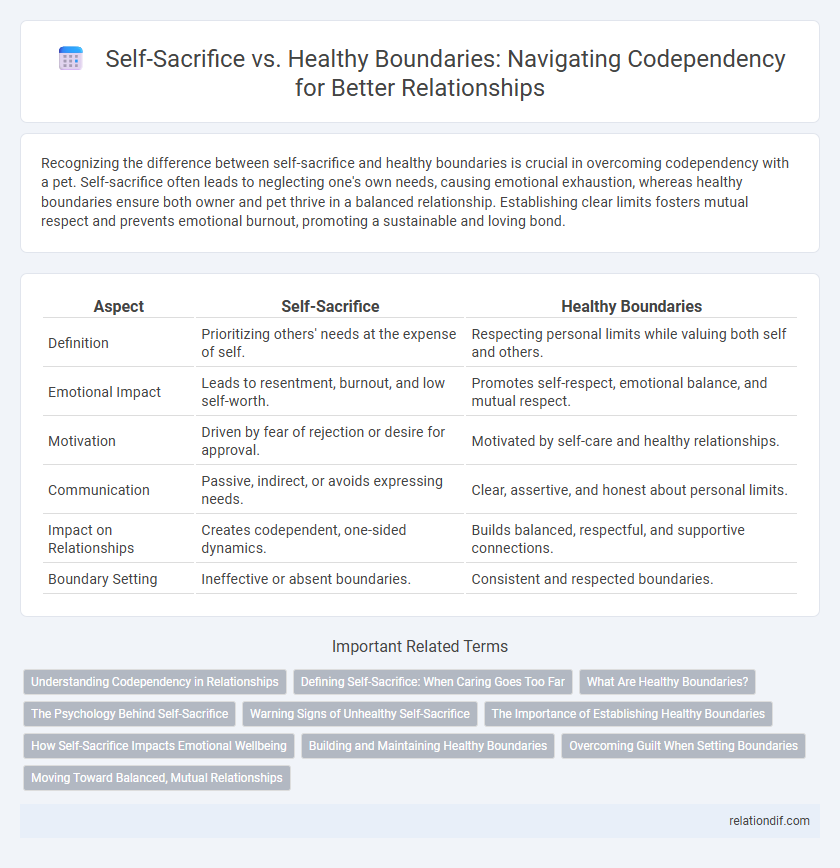Recognizing the difference between self-sacrifice and healthy boundaries is crucial in overcoming codependency with a pet. Self-sacrifice often leads to neglecting one's own needs, causing emotional exhaustion, whereas healthy boundaries ensure both owner and pet thrive in a balanced relationship. Establishing clear limits fosters mutual respect and prevents emotional burnout, promoting a sustainable and loving bond.
Table of Comparison
| Aspect | Self-Sacrifice | Healthy Boundaries |
|---|---|---|
| Definition | Prioritizing others' needs at the expense of self. | Respecting personal limits while valuing both self and others. |
| Emotional Impact | Leads to resentment, burnout, and low self-worth. | Promotes self-respect, emotional balance, and mutual respect. |
| Motivation | Driven by fear of rejection or desire for approval. | Motivated by self-care and healthy relationships. |
| Communication | Passive, indirect, or avoids expressing needs. | Clear, assertive, and honest about personal limits. |
| Impact on Relationships | Creates codependent, one-sided dynamics. | Builds balanced, respectful, and supportive connections. |
| Boundary Setting | Ineffective or absent boundaries. | Consistent and respected boundaries. |
Understanding Codependency in Relationships
Self-sacrifice in codependency often involves putting others' needs above one's own to gain approval or avoid conflict, leading to emotional exhaustion and loss of identity. Healthy boundaries, by contrast, enable individuals to maintain self-respect and autonomy while supporting others, fostering balanced and mutually respectful relationships. Understanding these distinctions is crucial for recognizing unhealthy patterns and promoting emotional wellness within interpersonal connections.
Defining Self-Sacrifice: When Caring Goes Too Far
Self-sacrifice occurs when individuals consistently prioritize others' needs at the expense of their own well-being, often leading to emotional exhaustion and resentment. This behavior is a hallmark of codependency, where caring becomes excessive, undermining personal boundaries and autonomy. Establishing healthy boundaries is essential to prevent self-sacrifice from dominating relationships and to maintain mutual respect and emotional balance.
What Are Healthy Boundaries?
Healthy boundaries define limits that protect individual autonomy while fostering respectful, balanced relationships. They involve clear communication of needs and limits, enabling self-care without guilt or overextension. Establishing these boundaries prevents self-sacrifice tendencies common in codependency by promoting mutual respect and emotional independence.
The Psychology Behind Self-Sacrifice
Self-sacrifice in codependency often stems from deep-seated fears of rejection and a need for external validation, driving individuals to prioritize others' needs over their own. This behavior disrupts healthy boundaries by fostering emotional enmeshment and diminishing self-identity. Understanding the psychology behind self-sacrifice reveals its roots in low self-esteem and attachment anxieties, highlighting the importance of establishing clear, balanced boundaries for mental well-being.
Warning Signs of Unhealthy Self-Sacrifice
Unhealthy self-sacrifice often manifests as chronic people-pleasing, neglecting personal needs, and feeling guilt when asserting boundaries. Warning signs include an excessive need for approval, difficulty saying no, and emotional exhaustion resulting from putting others' demands above one's well-being. Recognizing these patterns is crucial for establishing healthy boundaries to prevent codependent dynamics and promote emotional balance.
The Importance of Establishing Healthy Boundaries
Establishing healthy boundaries is crucial in overcoming codependency, as it prevents self-sacrifice from eroding personal well-being and identity. Clear limits foster mutual respect and autonomy in relationships, enabling individuals to support others without neglecting their own needs. Consistent boundary-setting reduces resentment and promotes emotional balance, essential for sustainable, healthy connections.
How Self-Sacrifice Impacts Emotional Wellbeing
Self-sacrifice in codependency often leads to emotional exhaustion, as individuals prioritize others' needs while neglecting their own mental health. This imbalance fosters resentment, anxiety, and a diminished sense of self-worth, undermining overall emotional wellbeing. Establishing healthy boundaries helps restore self-respect and emotional stability by ensuring personal needs are acknowledged and met.
Building and Maintaining Healthy Boundaries
Building and maintaining healthy boundaries involves recognizing and respecting your own needs while honoring others' limits. Establishing clear personal limits reduces codependent behaviors such as self-sacrifice, promoting emotional well-being and mutual respect in relationships. Consistent communication and self-awareness are crucial for reinforcing these boundaries and fostering balanced connections.
Overcoming Guilt When Setting Boundaries
Overcoming guilt when setting boundaries involves recognizing that self-sacrifice is not a measure of love or loyalty but often a step toward unhealthy codependency. Establishing healthy boundaries protects emotional well-being and fosters mutual respect in relationships while reducing resentment and burnout. Embracing self-care as a necessity rather than a selfish act is crucial for breaking patterns of guilt and promoting balanced, fulfilling connections.
Moving Toward Balanced, Mutual Relationships
Self-sacrifice in codependency often leads to neglecting one's own needs, whereas establishing healthy boundaries promotes mutual respect and emotional balance. Moving toward balanced relationships requires clear communication, consistent limits, and prioritizing self-care alongside caring for others. This shift fosters interdependence where both partners support each other's growth without losing individual identity.
Self-Sacrifice vs Healthy Boundaries Infographic

 relationdif.com
relationdif.com